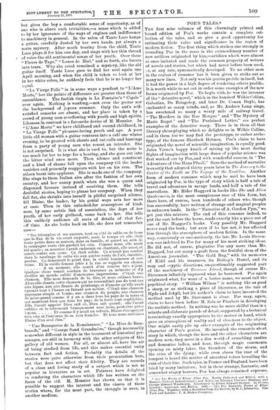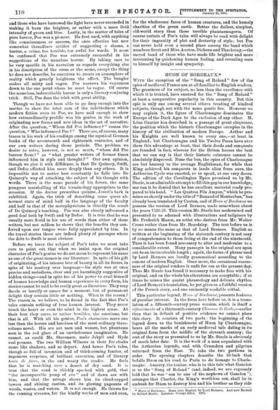POE'S TALES.*
THE first nine volumes of this charmingly printed and bound edition of Poe's works contain a complete col- lection of the tales, and so give a good opportunity for estimating their value and significance in the region of modern fiction. The first thing which strikes one strongly in rereading Poe in the mass is the extraordinary number of new artifices originated by him,—artifices which were almost at once imitated and made the common property of writers of novels and stories, but which had never before been used, cr, at any rate, systematically developed. To no other man in the realms of romance has it been given to strike out so many new lines. Not only was his genius prolific in itself, but it had the power in a high degree of rendering others prolific. It is worth while to set out in order some examples of the new forms originated by Poe. To begin with, he was the inventor of the " detective novel," which in the hands of Wilkie Collins, Gaboriau, De Boisgobey, and later Dr. Conan Doyle, has enchanted so many minds, and, as Mr. Andrew Lang sings, has sweetened so many a weary mile of railway travel. " The Murders in the Rue Morgue " and " The Mystery of Marie Roget " and "The Purloined Letter," are perfect examples of the detective story. There is in them all that literary chess-playing which so delights us in Wilkie Collins, and in them too we may find the prototype, or rather arche- type, of the famous Sherlock Holmes. Poe's claim to have originated the novel of scientific imagination, is equally good. Jules Verne's happy knack of mixing up the most daring flights of imagination with large doses of popular science was first worked out by Poe, and with wonderful success, in " The Adventure of One Hans Pfaall." Here the method of narrative is exactly that adopted thirty years later in The Journey to the Centre of the Earth or The Voyage of the Nautilus. Another form of modern romance which may be said to have been originated by Poe, is the type of story which is half a tale of travel and adventure in savage lands, and half a tale of the marvellous. Mr. Rider Haggard in books like She and Allan Quatermain, is the most conspicuous user of this form, but there have, of course, been hundreds of others who, though less successfully, have written of strange and magical peoples in unknown lands. In the " Narrative of A. Gordon Pym," we get just this mixture. The end of this romance indeed, to put the cart before the horse, reads exactly like a piece out of one of Mr. Haggard's books. Very possibly Mr. Haggard never read the book ; but even if he has not, it has affected him through the atmosphere of modern fiction. In the same way, consciously or unconsciously, the late Mr. Louis Steven. son was indebted to Poe for many of his most striking ideas. He did not, of course, plagiarise Poe any more than Mr. Haggard, but cut many a graft from the fruitful stem of the American journalist. " The Gold Bug," with its memories of Kidd and his treasures, its Bishop's Hostel, and its map and cryptic directions, unquestionably suggested part of the machinery of Treasure Island, though of course Mr. Stevenson infinitely improved what he borrowed. Poe again originated what, for want of a better name, we must call the psychical story. " William Wilson" is nothing like as good a story, or as striking a piece of literature, as the tale of Hyde and Jekyll, but its author's claim to have invented the method used by Mr. Stevenson is clear. Poe may, again, claim to have been before M. Zola or Flaubert in developing the realistic method. In nothing was be more skilful than in a minute and elaborate parade of detail, supported by a technical terminology exactly appropriate to the matter in hand, which gave an atmosphere of reality and of closeness to the object. One might easily pile up other examples of the originating character of Poe's genius. He invented the romantic short story in which, though the hero and the other characters are modern men, they move in a dim world of crumbling castles and demoniac ladies, and hear, through magic casements opening on misty lakes, the thunders of the storm, and the cries of the dying ; while even above the roar of the tempest is beard the mutter of ancestral voices bewailing the ruin of their line. Such tales, in France and England. have been tried by many imitators ; but in these strange, fantastic, and somewhat atagey horrors, Poe has always remained supreme, • (1.) The Works of Edgar Allan Poe. Newly Collected and Edited, with a Memoir, Critical Introductions, and Notes, by Edmund Clarence Stedman and George Edward Woodberry. Illustrated by Albert Edward Sterner. In 10 vols. London: Lawrence and Sullen. 1895.—(2.) The Complete Poem, of Edliar Allan Poe. Together with a Selection from his Stonier, by H. C. Edwardes. h ew York and London : F. A. Stokes Company.
and those who have borrowed the light have never succeeded in making it burn the brighter, or rather with a more livid intensity of green and blue. Lastly, in the matter of tales of pure horror, Poe was a pioneer. He first used, with anything like consciousness or success, the once effective but now somewhat threadbare artifice of suggesting a shame, a horror, a crime, too terrible, too awful for words. It must be confessed that Poe was extremely successful in his suggestions of the nameless horror. By taking care to be very specific in his narration as regards everything else in his description of the room or the scene, except the thing he does not describe, he contrives to create an atmosphere of reality which greatly heightens the effect. The bungler makes all misty and vague. Poe narrows his vagueness down to the one point where he must be vague. Of course the nameless, indescribable horror is only a literary conjuring trick. Still, Poe does the trick with great ability.
Though we have not been able to go deep enough into the matter to show the total sum of the indebtedness which modern fiction owes to Poe, we have said enough to show how extraordinarily prolific was his genius in the work of originating new forms and new ideas in the art of narrative. After the question, "Whom did Poe influence ? " comes the question, " Who influenced Poe ? " There are, of course, many traces in his work of his readings among the mystical German books of the seventeenth and eighteenth centuries, and of our own writers during those periods. The problem we desire to solve, however, is not so much, " whom did Poe borrow from ? " as " what greater writers of former times influenced him in style and thought ? " Our own opinion, though we give it with diffidence, is that De Quincey, Swift, and Defoe affected him more deeply than any others. It is impossible not to notice how constantly he falls into De Quincey's way of attacking the subject of his thought with words. There is the same parade of his forces, the same pompons marshalling of the terminology appropriate to the occasion. If the doctor prescribes quinine, Jesuit's bark is exhibited. Again, the trick of describing some queer ab- normal state of mind half in the language of the faculty and half in that of the metaphysicians is directly the result of De Qnincey's teaching. Poe was also clearly influenced a good deal both by Swift and by Defoe. It is true that he was usually more florid in his use of words than either of these writers, but not seldom he shows that the benefits they con- ferred upon our tongue were fully appreciated by him. In the travel stories there are indeed plenty of passages where the debt to Swift is most obvious.
Before we leave the subject of Poe's tales we must take care to point out that when we insist upon the original character of Poe's genius we do not mean to represent his name as one of the great names in our literature. In spite of his gift of originating, of his intense love of beauty in all its forms, in spite of his mastery over language—his style was at once precise and melodious, clear and yet hauntingly suggestive of hidden things—and in spite too of his power to avail himself of human knowledge and human experience in every form, his stories cannot be said to be really great as literature. They may dazzle or horrify or amaze for a moment, but of permanent delight they contain little or nothing. What is the reason ? The reason is, we believe, to be found in the fact that Poe's tales contain nothing of true human interest. They never touch the heart or even the mind in the highest sense. At their best they move, or rather bewilder, the emotions, but that is all. With all his genius, Poe's characters move one less than the heroes and heroines of the most ordinary three- volume novel. His are not men and women, but phantoms seen in the red glare of an unwholesome imagination. He cannot, as could Mr. Stevenson, make Jekyll and Hyde real persons. The two William Wilsons in their fur cloaks come like shadows, and so depart. And hence Poe's tales, though so full of invention and of thick-coming fancies, of ingenious surprises, of brilliant execution, and of literary tours de force, in the end weary the reader. He feels that he is marching over a desert of dry sand. It is true that the sand is thickly specked with gold, that " the incomparable pomp of eve " and of dawn are with him, and that the mirage shows him its cloud-capped towers and shining castles, and its glowing pageants of woods, wastes, and waters. It is not enough. He thirsts for the running streams, for the kindly works of men and oxen,
for the wholesome faces of human creatures, and the homely charities of the green earth. Better the dullest, simplest, old-world story than these terrible phantasmagoria. Of course certain of Poe's tales will always be read with delight for their ingenuity of plot and dexterity of style; but Poe can never hold even a second place among the band which numbers Scott and Miss Austen, Dickens and Thackeray,—the sacred band of those who have made life brighter and more interesting by quickening human feeling, and revealing man to himself by insight and sympathy.



















































 Previous page
Previous page